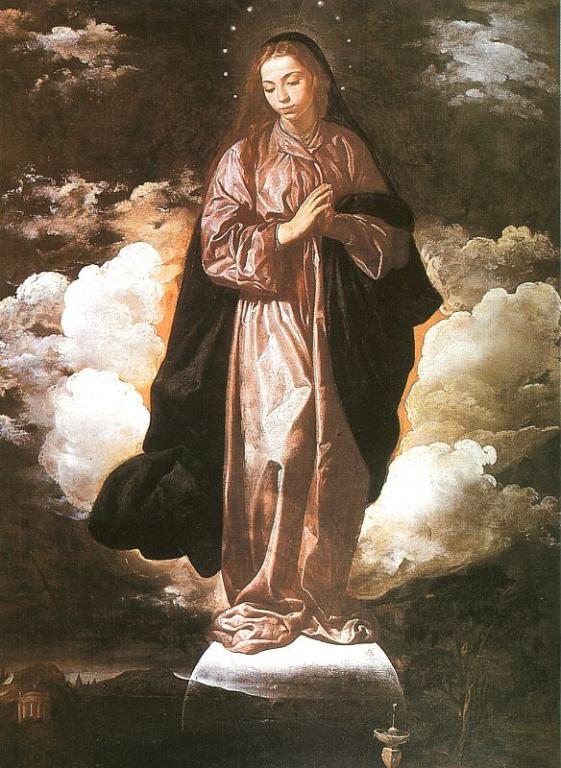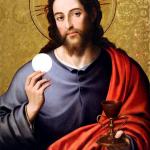
(12-7-06; final two paragraphs added on 12-8-17)
***
Many of our esteemed Protestant brethren have a big problem with Catholic beliefs concerning the Blessed Virgin Mary. Catholic convert Kimberly Hahn once gave a great talk (one of my own favorites) about her own past struggles, entitled, “Mary, Mary, Quite Contrary.”
Our Lady’s Immaculate Conception is one of these “controversial Catholic distinctives.” Like the other Marian doctrines, it’s not nearly as foreign to Scripture and Protestants’ own belief-system as often erroneously thought. I usually put forth two arguments in any introductory discussion on the topic with a Protestant.
First of all, I like to highlight the absolute primacy of grace in the Immaculate Conception. It’s not first and foremost about Mary, in the imagined sense that she somehow supposedly generates from herself extraordinary amounts of grace and righteousness; rather, it’s about God’s grace and the incarnation and what was appropriate and fitting for Jesus the God-Man to be born of a created, human mother.
None of us (including even the Blessed Virgin) can produce our own holiness; that’s a heresy called Pelagianism: long since condemned by the Church. It’s all ultimately from God.
We can then choose to cooperate with this grace or not. Mary needed a savior as much as any of us (hence, her statement in Luke 1:47: sometimes thrown at Catholics as a “gotcha” tactic). She was saved from ever falling into sin, rather than saved from existing sin. Her case arguably involved more free grace than anyone else’s ever did, since extra grace was expressly given to her by God from the very moment of her conception. Obviously, this had nothing to do with her own merit or choice.
Adam and Eve were sinless before they rebelled and fell, and the (created) unfallen angels are as well, so sinlessness is by no means impossible, biblically speaking.
Later, Mary chose to cooperate with God in the Annunciation (Luke 1:38; cf. Phil 2:13) and not ever sin, and this is indeed uniquely glorious among human beings and eminently worthy of a proper veneration (not “worship”!), but the origin of that was, again, pure grace (“alone”). Therefore, no Protestant can claim that the Immaculate Conception violates anything that the Bible says about grace. Quite the contrary . . .
The second thing to tell a Protestant wary about Mariology is the little-known fact that Martin Luther, the founder of Protestantism, believed in a somewhat modified form of the Immaculate Conception. He had a very “high” Mariology.
In 1544 (just two years before his death), he wrote: “God has formed the soul and body of the Virgin Mary full of the Holy Spirit, so that she is without all sins.” And in 1545 he stated that the Virgin Mary “has not sinned and cannot sin for ever more.” If even Martin Luther can accept the actual sinlessness of Mary, then any Protestant can do so, because nothing in this doctrine is contrary to Scripture at all, and indeed, “full of grace” (kecharitomene) in Luke 1:28 (rightly understood and deeply examined) is an explicit biblical proof of Mary’s freedom from actual sin.
Early Protestant leader Huldreich Zwingli also believed in the Immaculate Conception. He called her, “the Mother of God, the perpetually pure and immaculate Virgin Mary” and said that she was without “the smallest trace of a stain.” Sounding very much like a Catholic today, he wrote: “God has also sanctified and purified the mother (of the holy Son), for it was fitting that so holy a Son should have so holy a mother.”
Likewise, Zwingli’s successor in Zurich, Heinrich Bullinger wrote that Mary was “sanctified through the grace and blood of her own son and through the gift of the Holy Spirit has been richly gifted above all women” and that she was “full of grace” and “has special favor and grace with God and received the most and largest gift of grace from God, and that is why she is the most pleasing and beloved to God of all.”
***
Photo credit: Immaculate Conception (c. 1618), by Diego Velázquez (1599–1660) [public domain / Wikimedia Commons]
***













